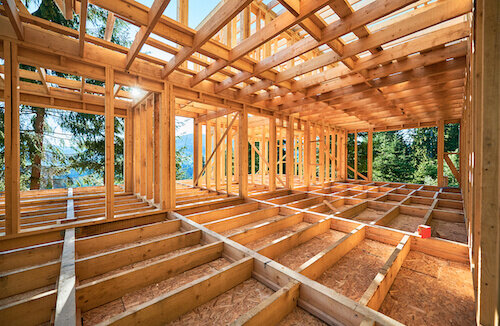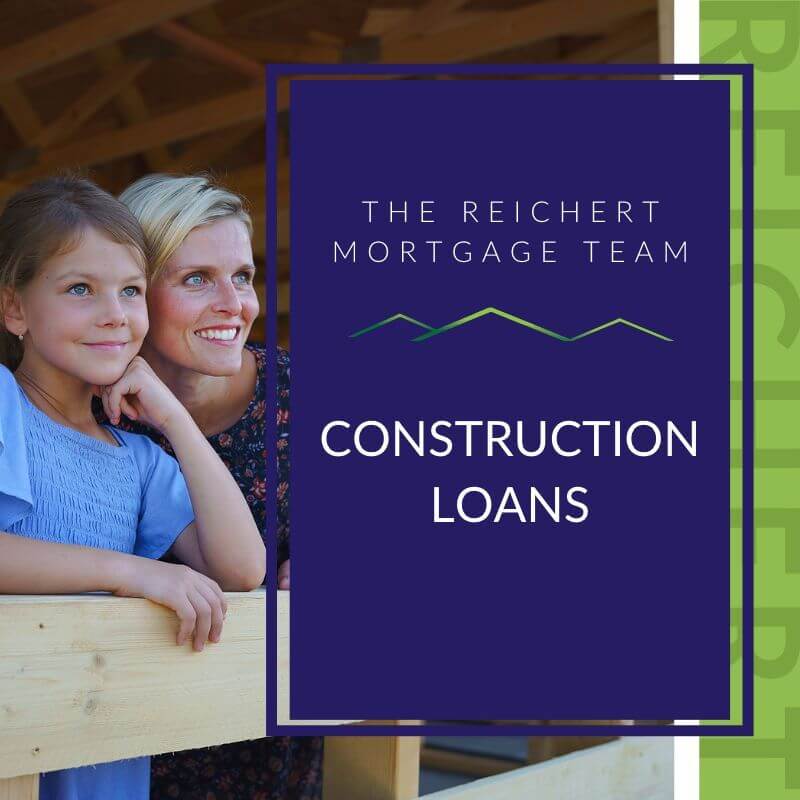What is a Construction Loan?
A short-term loan used to finance the construction of a new building or the renovation of an existing one. Construction loans differ from traditional mortgages in several ways.
- Construction loans are usually made in stages, as the construction progresses. This allows the lender to make sure the borrower is using the funds for their intended purpose and the project is progressing on schedule.
- Construction loans typically have shorter terms than traditional mortgages with construction-only loans becoming due to be repaid once the construction is complete and the property is ready for occupancy.
- Construction loans often have higher interest rates than traditional mortgages. This rise in interest is due to the lender taking on more risk, as the property is not yet completed and the assessment of value is made on a project in progress rather than a finished asset.

There Are Two Main Types Of Construction Loans
- Construction-only loans are the basic construction loans used to build or remodel homes. These loans are made and paid in stages throughout the construction process and are due in full at the end of construction. These short-term loans are often combined with a more traditional mortgage loan to create a C/P loan.
- Construction to permanent loans, also known as a C/P loan, is a type of financing that combines a construction loan with a permanent mortgage. This type of loan is typically used to finance the construction of a new home or the renovation of an existing home.ith a C/P loan, the borrower receives a construction loan to cover the costs of building the home or renovating the property. Once construction is complete, the construction loan is automatically converted into a permanent mortgage.
What Are Common Construction Loan Requirements?
Common construction loan requirements differ depending on the lender and the terms of the loan. Always speak with a lender to find out what their specific requirements are before applying for a construction loan. Common requirements for a construction loan may include:
- Good credit scores: Credit score requirements are commonly 700+ depending on the lender. The credit score may also impact the interest rate of the loan.
- Debt-to-income ratio: A debt-to-income ratio is a measure of how much debt a borrower has compared to their income. Lenders usually expect a debt-to-income ratio of no greater than 50% though some will require the ratio to be 36% or below.
- Minimum down payment: Most lenders will require a downpayment of at least 20% for construction loans. Some lenders may accept a lower down payment depending on credit score and debt-to-income ratio.
- Assets: Assets including cash, investments, retirement accounts, and real estate are often used to determine the ability to repay a construction loan. Assets can be used to make a down payment, usually about 20% of the project cost in assets.
- Approved builder: Lenders will typically have a list of approved builders that they work with. If a borrower wants to use a builder that is not on the lender’s list, the borrower may need to provide the lender with additional documentation showing that the builder is qualified.
Some lenders may also have additional requirements. These may include:
- Property Appraisal: Many lenders may require an appraisal of the property being constructed to ensure that the loan amount is not more than the expected appraised property value.
- Construction plans and estimates: Some lenders may require construction plans and estimates from licensed and approved contractors to ensure project feasibility within the approved loan budget.
- Liability insurance: Liability insurance may be required to obtain a construction loan. A lender may require the borrower or builder to have general liability insurance or builder’s risk insurance. These insurance policies are designed to protect the borrower, lender, and builder if injury, theft, or unforeseen events happen during your construction.

How To Get A Loan For Construction
Acquiring a construction loan starts with pre-approval for a loan. This will give you an idea of how much money you can borrow and what your monthly payments will be during construction. During the pre-approval process, you will need financial documentation including your most recent tax returns, pay stubs, bank statements, and investment statements. Gather any documentation that shows your assets and proof of down payment. Make sure you have all your loan requirements ready to show your lender. Once you have your pre-approval for a loan you need to find a qualified builder.
The lender will typically have a list of approved builders that they work with. If you want to use a builder that is not on the lender’s list, you may be able to provide the lender with additional documentation to have your builder approved. Make sure the builder is licensed and insured. It is also a good idea to get references from previous clients before committing to a builder.
Once you have a builder you need to get a construction loan estimate. The builder will need to provide an estimate that shows your lender the cost of the project, and the length of time it will take to complete. You will also need to tell the lender the type of construction loan you are interested in.
Once the lender approves your loan it is time to sign the loan documents. These documents will outline the terms of the loan, such as the interest rate, the repayment schedule, and the fees.
After the loan documents are signed you can start construction on your home.
One-Time Close Construction Loan
What is a one-time close construction loan? A one-time close construction loan, also known as a single-close construction loan or construction-to-permanent loan (CTP loan), allows borrowers to finance the construction of a new home and mortgage for the home in a single transaction. So, what are the benefits and key features of one-time construction loans?
One-time close construction loans offer several advantages over traditional construction loans:
- Convenience: Borrowers only have to go through one closing process for their construction and mortgage, saving time and money.
- Fewer closing costs: Because there is only one closing, borrowers typically pay fewer closing costs than with a traditional construction loan and traditional mortgage.
- Streamlined process: The loan process is typically more streamlined with a one-time close construction loan vs. a traditional construction loan + traditional mortgage.
While one-time close construction loans provide a more convenient, streamlined process, here are some disadvantages of one-time close construction loans:
- Higher interest rates: Interest rates on one-time close construction loans are typically slightly higher than interest rates on traditional construction loans due to the riskier investment.
- More restrictive requirements: Lenders may have more restrictive requirements for one-time close construction loans, such as requiring a higher down payment or a higher credit score.

Conventional One-Time Close Construction Loans
What are the Requirements for a Conventional One-Time Close Construction Loan?
Loan requirements for a conventional one-time close construction loan are the same as other construction loans. This makes the decision to take out a one-time close construction loan a great choice for homeowners building or renovating a home for themselves with no plan to sell in the near future.
What is the Application Process for a one-time close construction loan?
Much like the process for a construction-only loan, the application process for a one-time close construction loan requires the same approvals, documentation, and credit checks you need to be prepared for with any loan. Make sure you work with a lender like Reichert Mortgage who specializes in one-time close construction loans (you can apply here now) to help you navigate the process. OTC Construction loans can take longer than traditional mortgage loans. Be patient and work with your lender to get your construction plans and loan approved.
How Does A Conventional One Time Close Construction Loan Work?
With a conventional one-time close construction loan, the borrower receives both an interim construction loan and a 30-year permanent loan at the same time. The borrower signs the 30-year amortizing promissory note at closing.
The interim construction loan is used to finance the construction of the new home, and the permanent loan is used to repay the interim construction loan once the home is completed. The interim construction loan typically has a draw period, during which the borrower can access funds as needed, and a repayment period, during which the loan must be repaid in full. The permanent loan typically has a longer repayment period than the interim construction loan. For veterans, VA One Time Close Construction Loans open this option to current and prior service members who might not otherwise qualify for a conventional One Time Close Construction Loan.

There Are Three Types Of VA Construction Loans
- VA Construction Loan- VA construction loans are loans available for military veterans who have served on active duty for at least 90 days and Reservist or National Guard members who have been called to active duty for at least 90 days.
- VA Construction to Permanent Loan- A VA Construction to permanent loan is a great option for eligible veterans interested in using a one-time close construction loan to build a new home. This loan offers a number of benefits and advantages for qualified veterans.
- VA One-Time Close Construction Loan- A VA one-time close construction loan, or VA construction to permanent loan, is a VA Construction and mortgage loan that allows eligible veterans to finance the construction of a new home, including the purchase of land, with a single loan.
How Does A VA One Time Close Construction Loan Work?
VA One time close construction loans work in the same way conventional one time close construction loans work. Once you have been approved for a VA one-time close construction loan, the lender will disburse the funds to the builder in a series of payments or draws. The number of draws and amount of each draw will be determined by the lender and builder. The first draw will usually be used the cover the cost of the land. Remaining draws will be used to cover the cost of construction as the builder completes each phase of the project.
Once the home is complete, the construction loan will be converted to a permanent mortgage. The terms of the mortgage will be agreed upon at the time of the initial loan approval.
When your construction loan is converted to a permanent mortgage, you may be able to refinance the loan to take advantage of lower interest rates, if lower rates exist. However, you should be aware that there may be closing costs associated with refinancing.
What Are The VA Construction Loan Requirements?
VA construction loan requirements differ depending on your location and lender. Standard requirements are:
- Eligibility: You must meet veteran, reservist, or National Guard requirements.
- Credit Score and Debt-to-income ratio: Each lender sets their own requirements for Credit score and debt-to-income ratio. These factors will heavily influence your interest rate for your VA construction loan.
- Closing costs: You will need to prove the availability of funds for closing costs. The closing costs for a VA construction loan will vary depending on the lender and the location of the property. Generally, you can expect to pay closing costs similar to traditional construction loans.
What is the debt-to-income ratio for a VA Construction Loan?
The debt-to-income (DTI) ratio for a VA construction loan will vary for each lender with typical DTI requirements around 41% or less. This means that your monthly debt payments, including your projected mortgage payment, should not exceed 41% of your gross monthly income.
Some lenders may offer exceptions to this rule. For example, if you have tax-free income, you may be able to qualify for a VA construction loan with a DTI ratio of up to 50%.
What is the minimum FICO score for a VA Construction Loan?
The VA does not set a minimum credit score requirement for its loans. However, most lenders will require a credit score of at least 620 for a VA construction loan. Some lenders may be willing to approve a VA construction loan with a lower credit score, but this will likely raise your interest rate. Make sure to check with your lender for their minimum credit score requirements.
How Does The VA One-time Close Construction Loan Application Process Work?
When applying for a VA One-time close construction loan make sure you follow these simple steps:
- Gather your documents. You will need a number of documents to apply for a VA one-time close construction loan including:
- Your Certificate of Eligibility (COE) from the VA
- Your most recent tax returns
- Your most recent pay stubs
- A credit report
- A copy of your builder’s contract*
- A set of construction plans*
*These documents are not necessary if you are seeking pre-approval for a One-time close construction loan.
- Find a lender. Not all lenders offer VA one-time close construction loans, but we do.
- Apply for the loan. You can apply here now.
- Underwriting. Your lender will then underwrite your loan. This process involves reviewing your financial documents and ensuring you meet the VA and lender requirements.
- Closing. If your loan is approved, you will close on the loan. This is when you will sign all the paperwork and receive the funds.
- Construction. Once the loan is closed, the construction can begin! Your lender will disburse funds to the builder in a series of payments or draws.

What Are The Benefits Of A VA OTC Construction Loan?
There are several benefits to using a VA One-time close construction loan, including:
- No down payment. VA loans do not require a down payment. This means you can use your savings for other expenses such as closing costs.
- Just one closing, Just one Loan. VA OTC construction loans offer a more streamlined process by combining the construction loan with a traditional mortgage so you only deal with one closing, one closing cost, and one loan.
- No mortgage insurance. VA loans don’t require mortgage insurance, saving you hundreds or even thousands of dollars.
- Competitive Interest rates. VA loans typically have competitive interest rates, saving you even more money on your monthly mortgage payments.
- Easier to Qualify. First time buyers and veterans and service members who struggle to qualify for conventional loans can find opportunities for home ownership with a VA OTC Construction Loan.
Apply For A Single Close Construction Loan
Contact Reichert Mortgage Team today for more information about your conventional or VA loan requests.










